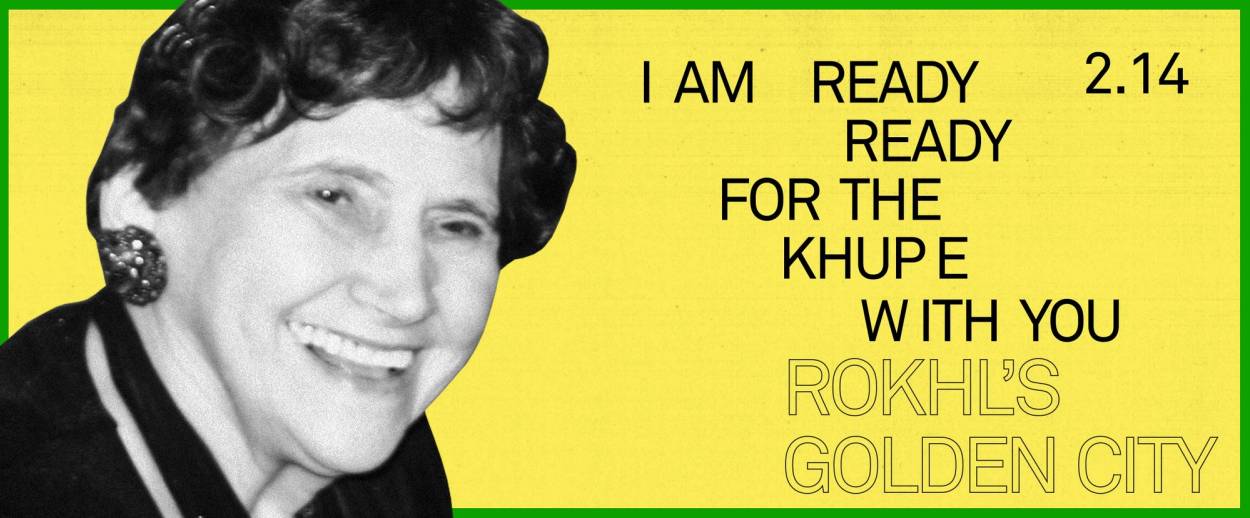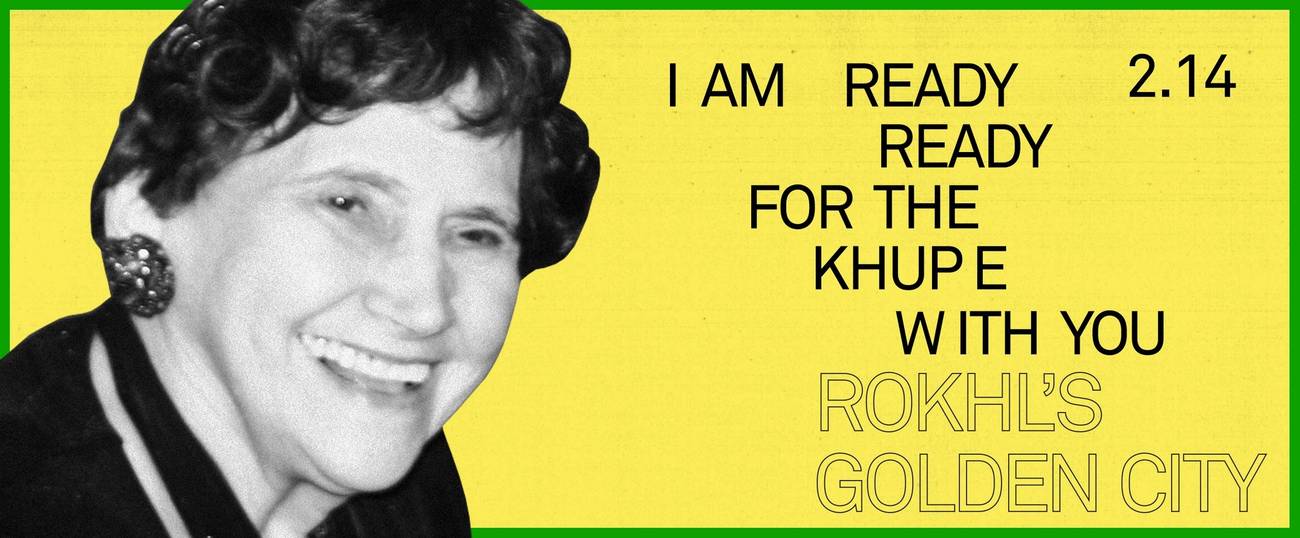Hot Yiddish
Rokhl’s Golden City: Turning the mameloshn into erotic poetry




This isn’t a story about Harry Potter.
The year is still young, but there are already two big stories in the world of Yiddish literature. The first regards my friend Arun Viswanath’s brilliant new translation of Harry Potter into Yiddish. The second comes with a mature-content warning (or enticement) on the cover. It’s 2020, folks, and Yiddish publishing contains multitudes.
Though their content is, shall we say, worlds apart, Viswanath’s translation of Harry Potter and Troim Katz Handler’s new poetry collection called Simkhe II share common concerns. Both were responding to a deeply felt lack. “Modern, engaging children’s literature was practically nonexistent,” Viswanath told Tablet. “Instead, my siblings and I, along with our Yiddish-speaking peers, had to make do with outdated works, often dating back before WWII.” Handler, meanwhile, set out to gather a modern erotic vocabulary for poetic purposes, a vocabulary that had barely existed in Yiddish literature. She combed available reference works and spent months in close consultation with legendary Yiddish linguist Dr. Mordkhe Schaechter, as well as other experts.
Handler’s experience speaks to that of many Yiddish language learners, who find that the juiciest, most urgent vocabulary falls in a sort of gray area between “don’t ask” and “I don’t know.” What’s amazing is that despite Handler having two Yiddish writers as parents and going to a Yiddish school and—at age 93—being a good five decades older than I am, she and I encountered the same, rather prudish infrastructure erected by the men who created modern Yiddish literature and academia. Uriel Weinreich’s Modern English-Yiddish/Yiddish-English Dictionary was the only game in town for decades, but a first-year Yiddish student would look inside in vain for anything remotely useful to a college student’s extracurriculars.
So naturally, when I got my hands on Simkhe II, I immediately mined it for the erotic gold therein. And I wondered: Was this vocabulary really so obscure? Thanks to technology, there’s now a way to find out. The Yiddish Book Center recently announced it had made its 11,000-book digital collection searchable via optical character recognition. OCR “refers to any technique that converts an image of text into a file containing the characters found in that image,” according to Refoyl Finkel, a computer scientist who has been developing OCR, and specifically Yiddish OCR, for many years. This means that, theoretically, any printed book could be instantly searchable from your computer, a development that will revolutionize the field of Yiddish literature. Unfortunately, the OCR search is still in beta-testing, so you have to log in to use it. Which means that somewhere in the vast data trove of the book center you can track my late night search on words like shmue (vagina) and kis (testicles)—to name two relatively tame examples from the book. The results were disappointing. It was just like being back in college, or third grade, except my furtive searchings are now instantly accessible by the NSA.
Simkhe II is more than a groundbreaking volume of sexually explicit Yiddish love poetry; it’s a nested set of intimate entanglements. At the center is the book itself, conceived as a set of “Love-Letter Poems” between two fictional characters, Tema and Simkhe. Two married 30-somethings, they cross paths at a Yiddish conference where they spend one unforgettable night together. Over the next 36 years, they carry on a clandestine affair via phone, fax, and old-fashioned letter.
Handler began writing the poems in 1991 and the cycle now contains 573 poems, though only a small portion have been published: The first Simkhe volume appeared in 2001, with 70 poems, and was limited to the less erotically explicit. This new volume contains 63 poems, the heat of which may singe the eyebrows of the more conservative reader. If you’re looking to expand your practical Yiddish vocabulary, Simkhe II is for you. Indeed, in the tradition of Schaechter, Handler is very clear that she wanted Simkhe II to serve a pedagogical, as well as an aesthetic, function. The design of the book—with the Yiddish, transliteration, and English translation lined up next to each other—enhances their pedagogical usefulness. The final product owes much to the countless hours of work by Pearl Krupit and Simkhe editor Shoshke-Rayzl Juni, who turned hundreds of Handler’s typewritten sheets—she only works on a typewriter—into an attractive and highly functional book. As Juni said on a recent Vaybertaytsh podcast, even with newer, more comprehensive dictionaries appearing in the last few years, “A verterbukh iz nisht di zelbe zakh vi a loshn.” (A dictionary is not the same thing as a language.) A living language needs poetry.
It takes an enormous amount of effort to enter the text into the computer then typeset it in three columns with the Yiddish, transliteration, and English; the editing and production work was done on a volunteer basis. Even just the 63 poems in this volume add up to a huge book. One day all 573 will be published, but it has to wait until the necessary resources are available.
The English translations for Simkhe were done by a man who goes by the pseudonym Shimon Beyles. Shimon Beyles, who passed away before the publication of Simkhe II, was an American-born resident of the Yiddish speaking Haredi world. “Before agreeing to translate her work,” the introductory material tells us, “he swore Handler to secrecy.” Who was this secret translator? Why would Handler choose a translator for whom the work was so risky? Why would Shimon Beyles take on a nearly two-decade project for which he could never receive credit? You could also ask, why do people have affairs? If you’ve had one, you know why.
And then there are the ghostly entanglements, the anxiety of influence and the electric charge generated in casting it off. Handler pinpoints her reinvention as a writer to the death of her father, the Yiddish poet Menke Katz. (Handler’s half-brother is the Yiddish scholar Dovid Katz.) She had never written a poem before, and yet, the day after his funeral in 1991—when she was already 64 years old—she found herself at her Yiddish typewriter writing poetry.
Menke Katz wasn’t just a poet of note, he was an author of infamous lyrics, his long poem Dray Shvester (Three Sisters) being too hot for the New York communist scene in which Katz was enmeshed in the early 1930s. It got him kicked out of Proletpen and his work denounced as “decadence and degeneracy” by Morgn Frayhayt editor Moyshe Olgin.
Menke was the often-absent poet-father whose life was marked by “decadence.” After his death, Troim spent decades, it seems, returning to the places where her relationship with Menke was warped by disconnect and incompleteness. How is it that we can feel this acute lack of essential vocabulary when our own parents, both literal and figurative, hoarded it for their own adventure? But then again, isn’t this the basic formula of longing? To want and want and never quite get what you desire? Desire fulfilled is desire extinguished.
In their essay “Eroto-philology: Sex, language, and Yiddish history,” Zohar Weiman-Kelman, an Israeli Yiddish literary scholar, examines how some (male) Yiddish linguists and philologists (like Schaechter) did indeed search out a vocabulary of sexuality. Those efforts, however, were characterized by their own incompleteness and failure to codify their work. Weiman-Kelman finds a kind of playful queerness in those failures. They created open-ended legacies that invite the interventions of readers and scholars (and poets like Troim Katz Handler) today.
*
There was one Yiddish writer of that earlier era who I believe left the most complete working out of Yiddish erotics. Celia Dropkin dared to write the body—its desire, its messiness, its humiliation—from a woman’s point of view. And for that she was mercilessly strafed by the leading (male) Yiddish intellectuals of the day. Though her writing remained—just barely—metaphorical, Dropkin translator Faith Jones names her as “the most sexually and bodily explicit of pretty much any writer in Yiddish.”
This summer I had my breath taken away by Dropkin’s poem “Suck,” which opens:
Du kvelst, ikh kvel.
Es kvelt in undz der got,
Vos makht fun alts a tel,
Vos veyst nisht fun farbot.
(You swell, I swell
Within us swells a god
Which makes of everything a ruin
And knows nothing of forbidden.)
The narrator of the poem asks her lover to nail her to a cross, to consume her, to suck every drop from her and walk away. She rhymes krayts (cross) with rayts (sex appeal) to astonishing effect.
In American-Jewish English, kvell has been shrunken down in connotation, reduced to taking pride in one’s children or its association with motherhood more generally. Dropkin infuses kvel with a much more primal vulnerability, one in which kvel may mean an uncontrollable gushing, of desire, of emotion, of the stickiness of human procreation. Kveln also carries a paradoxical second meaning, to torment or torture, introducing a masochistic question to the verse.
From his position as an outsider to Jewish life, Leopold von Sacher-Masoch figured Jewish women as cruel goddesses, wrapped in furs, exotic, dominating Others who ultimately served the fantasies of a far more powerful man.
Dropkin presents us with a much more radical literary position. As Weiman-Kelman describes it, “the erotic potential of sado-masochistic role play is one way I’ve learned to be able to formulate weakness as a position of choice and of power. It is also a way to find potential pleasure in places where weakness or even failure are not a choice.”
I understand why her male contemporaries worked so hard to minimize Dropkin’s poetic vision. It is a terrifying thing to admit that we may be powerless, and, perhaps, unforgivable, to suggest that we embody that powerlessness. But it is there, in that vulnerability, that we may meet the truest pleasure of the human encounter.
BUY: Take advantage of a Valentine’s Day discount to purchase Simkhe II from the author, all through the month of February, here … The most important bilingual volume of Celia Dropkin poems, The Acrobat, came out just a few years ago.
WATCH: Troim Katz Handler tells her life story.
ATTEND: Stanford University is holding a Celia Dropkin Symposium, March 10. Open to the public. More info here.
LISTEN: In this Vaybertaytsh podcast episode, Pearl Krupit and Shoshke-Rayzl Juni (editor of Simkhe) discuss the making of Simkhe II and Troim Katz Handler reads her own poetry (in Yiddish).
ALSO: The surprise Yiddish mumblecore hit Menashe is now streaming on Netflix … If you happen to be in Seattle you may be able to catch Seattle Yiddish Fest, with a sensational lineup of musicians from all over the world, doing what they do best. Feb. 14-16 … Lomir Ale Zingen: Learning Yiddish Through Communal Song is a new regular event for Yiddish learners of all levels. Feb, 23 at 4 p.m., Greenpoint Shul, 108 Noble St., Brooklyn … Did you know the Strand had a rare book room? Seems like the kind of thing Ben Katchor would invent if it didn’t exist already. Fittingly, Katchor will celebrate the publication of his new book, The Dairy Restaurant, at the Strand, where he’ll be in conversation with Fran Lebowitz. March 12, 7 p.m. Tickets required …The Grammy-nominated Yiddish Glory project is coming back to New York, bringing its (no longer) lost songs of Soviet Jews during WWII. March 30 and 31 at the Museum of Jewish Heritage … The Workers Circle in New York continues to expand its already impressive array of Yiddish classes, both in person and online. Registration for spring classes is open now, most start in March … InGeveb just put up its excellent roundup of Yiddish summer programs for 2020.
***
Like this article? Sign up for our Daily Digest to get Tablet magazine’s new content in your inbox each morning.
Rokhl Kafrissen is a New York-based cultural critic and playwright.